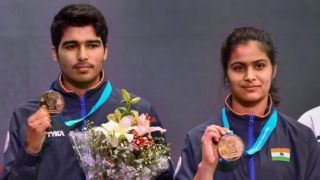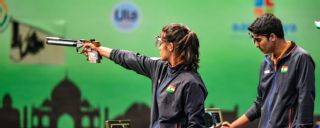|
Manu Bhaker finally had a smile on her face. She had endured four days of visible misery at the ISSF Shooting World Cup in New Delhi. She had been in tears as she was hugged by her junior coach Jaspal Rana after a fifth-place finish in the 25m rapid fire pistol event on Monday and had slumped in a chair even as that earlier loss was compounded by a failure to qualify for the final of the air pistol event a day ago. But there was redemption due for the 17-year-old on the final day of the competition. It came in the mixed team air pistol event. It's true that the gold didn't come with an Olympic quota but just the fact that she was able to stand on the top of the podium with a gold around her neck must have been a relief for Bhaker, who had last won a World Cup medal at her inaugural competition in March last year. "It's not a big relief, but satisfaction. In the earlier events, I couldn't do well despite efforts. Now I have won a medal, so it builds hope that I can do better next time. So that's why satisfaction," she said. There wasn't every any doubting Bhaker's technical ability. Her record over the last year would answer that argument. But the 17-year-old had shown emotional frailties that in the words of coach Pavel Smirnov "makes her technique useless." It wasn't as if there were no moments of vulnerability. But where Bhaker might once have crumpled under the pressure, she had the presence of Saurabh Chaudhary to steel her resolve. Chaudhary, like Bhaker is 17. He too stamped his presence in the senior team last year, with an Asian Games gold medal. Like her, he too has to write his school exams in a couple of days' time. But that's where the similarities end. Unlike Bhaker, he shows no emotion, only smiling when receiving his medal. He's received plenty of them now. He had won his first World Cup medal in the 10m pistol event on Saturday, demolishing a high-class field with a world record final score. And on Wednesday he won his second gold of the tournament, crushing the field with Bhaker alongside this time. After the two had qualified for the final with a world record score of 778, they had started poorly with Chaudhary getting off to an inexplicably slow start - shooting rounds of 9.4 and 9.8 first up. Bhaker seemed to feel the pressure and released her own shot of 9.1. But then, with the team flirting with last place, Chaudhary shot a 10.8. A couple of shots later Bhaker would shoot another low score of 9.8 only for Chaudhary to lift the pair up once again with another 10.8.  A high scoring second series closed in the gap on the leaders and while Chaudhary had a surprisingly poor third series of shots - his scores included a 9.8 and a 8.9 - the gap continued to close. By the first round of elimination, India had seized the lead and as Chaudhary found his groove, they increased it with every round of elimination, eventually winning by a massive 5.7 points. Chaudhary in particular picked up any slack left by Bhaker who shot two scores of 9.8 and 9.3 in the final elimination series, by shooting just a single shot outside the 10 ring. After the win, Bhaker would acknowledge the role Chaudhary played in keeping her in the contest. "What I like about Saurabh is that he is very calm. He is very positive all the time. Even if we are down, he will always believe that we have a chance. He always says 'Come on, we can do it.' He never loses hope," she said. Chaudhary soaked in pressure and had her back even when Bhaker seemed to fluff her concentration and pulled back from a shot, costing the team time. "It wasn't a problem. I always had enough time to shoot," he said after the match. Chaudhary was modest about his contribution to the match, but his role might be more than just helping Bhaker win a world cup medal. That bit of gold seemed to lift her spirits and boost her ahead of a crucial year. "This was important for her," admitted her father Ramkishan Bhaker. "She was feeling down because of how she had done. There's no quota but it was important for her to get the confidence that she can win a World Cup. There are many more tournaments in the year for her," he says.
|

